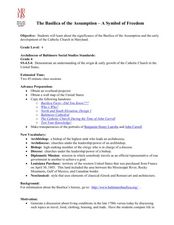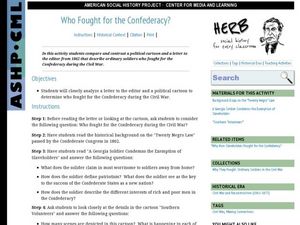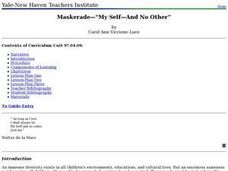Teaching Tolerance
Using Photographs to Teach Social Justice | Supporting Social Border Crossings
A lunch-time activity encourages pupils to step out of their usual lunch bunch and connect with someone new. To begin, individuals examine a group photograph and identify what they believe is the gender, race, religion, and sexual...
Teaching Tolerance
Using Photographs to Teach Social Justice | Affirming Our Commonalities and Differences
Photos can challenge stereotypes. To gain an understanding of the big picture, groups examine a series of photographs and analyze how a photographer's choices can shape a viewer's reaction to an image. For the first set of photographs,...
Curated OER
Socialism vs Capitalism
Students engage in an activity to show the differences between Socialism and Capitalism. In this socialism and capitalism lesson, students break into groups and are given scenarios to analyze. Students respond to each scenario and list...
Facing History and Ourselves
Transcending Single Stories
The focus of the second lesson in the Standing Up for Democracy unit is on the power of assumptions based on a single experience or point of view. Class members begin by journaling about assumptions others make about their identity based...
Curated OER
Creating Social Stories
Developmentally disabled students participate in the creation of their own social stories. They select a topic for their social story and work with the teacher to write a social story or create a video social story presentation.
Facing History and Ourselves
Why Little Things Are Big
Often our decisions are impacted by a fear of how others see us. That's the big idea in a two-day lesson that asks how false assumptions, how our fear of how others may see us, impact how we act. After watching a video about such a...
Curated OER
What Can We Learn From the Past?
What would future archeologists learn from your scholars' personal belongings? Have them bring in a box of "primary sources" from their home. Discuss the difference between observations and inference, using some of your own items to...
Curated OER
Stereotypes
Assumptions and misconceptions are two things that underlie stereotypes. Introduce youngsters to the concept of stereotyping with a role-play activity. They pretend they are employees at a restaurant who have accused a person of...
Curated OER
Social Boundaries Activity: Map It Out
Students observe the school for one week to identify social boundaries. In this map it out activity, students sketch the school's social boundaries, identifying where social cliques hang out. Students compare their viewpoints and...
Curated OER
Understanding Stereotypes
Pupils confront age-related stereotypes, explore how stereotyping impacts their lives, and discuss how they can make changes to reduce over-generalizations, unfair assumptions, and critical judgments about people groups. They use a...
Curated OER
The Basilica of the Assumption-A Symbol of Freedom
Fourth graders explore the importance of the Basilica of Assumption and the development of the Catholic Church in Maryland. For this social studies lesson, 4th graders discuss the Basilica of the Assumption and the Catholic Church.
Alabama Department of Archives and History
Alabama's 1901 Constitution: What Was at Stake?
Who should be able to vote? As part of a study of the 1901 Alabama Constitution, class members examine primary source document that reveal the reasons the authors gave to support their positions on this question and their assumptions in...
Curated OER
Who Fought for the Confederacy?
Did the Confederate Army really consist of southern volunteers? Using primary sources, historians examine the story behind the "Twenty Negro Law" and realities of conscription during the Civil War. A letter and a lithograph (included as...
Advocates for Human Rights
The Right to Workers in United States
To raise awareness and understanding of modern-day slavery, class groups research the various forms of slavery, including human trafficking, read and reflect on case studies, and design a plan of action for their community.
Facing History and Ourselves
Identity and Labels
Scholars look at the connections between identity and labels, assumptions, and stereotypes, in a lesson that examines identity in the United States. To set the stage for a discussion of these connections, class members analyze a cartoon,...
Facing History and Ourselves
Identity and Choices
Timshel! Thou mayest! is the big idea in a activity that reminds learners that they have choices about how they present themselves to others. To begin, individuals rate the degree to which the choices they make each morning are...
Curated OER
Firefighting and Community in Colonial America
Students view two unknown historical objects and try to identify their function by looking at and asking questions of their appearance and function. They use critical thinking skills to view a number of images and objects. They make...
Curated OER
Marketing to Teens: Gotta Have It! Designer & Brand Names
Advertisers want us to believe we would be accepted if we wore the right clothes or owned the right stuff. This assumption forms the heart of an exploration of the impact of advertising on teenagers. A safe classroom environment would...
National Woman's History Museum
19th Amendment
As part of a study of the women's suffrage movement and the ratification of the Nineteenth Amendment, young historians examine documents that detail when voting rights were granted to women in various countries and when US states...
Curated OER
Cultural Issues
Students observe another culture using a provided simulation script and then make assumptions about that culture based on what they witnessed. They will later be debriefed and talk about the assumptions they made that were not accurate.
Curated OER
Maskerade, My Self, And No Other
Students examine themselves, discover their strong, positive attributes, and recognize areas in need of improvement (since each individual possesses strengths but all people have some weaknesses). They develop self-acceptance, trust in...
Curated OER
Microfinancing Works for Local Citizens and Foreign Business
Students define social responsibility. They describe examples of social responsibilities businesses have to society. Analyze special challenges in operations. Identify entrepreneurial opportunities available in international business.
Curated OER
Mapping Colonial New England: Looking at the Landscape of New England
High schoolers understand the similarities and differences between English and Native American conceptions of the land and town settlement. They understand how the colony of Massachusetts developed and expanded. Students understand the...
Curated OER
Investigation of Immigration
Students assume the role of a crime scene detective and examine the lives of various immigrant groups. In this immigration instructional activity, students examine evidence, websites, and pull from existing knowledge to determine which...

























